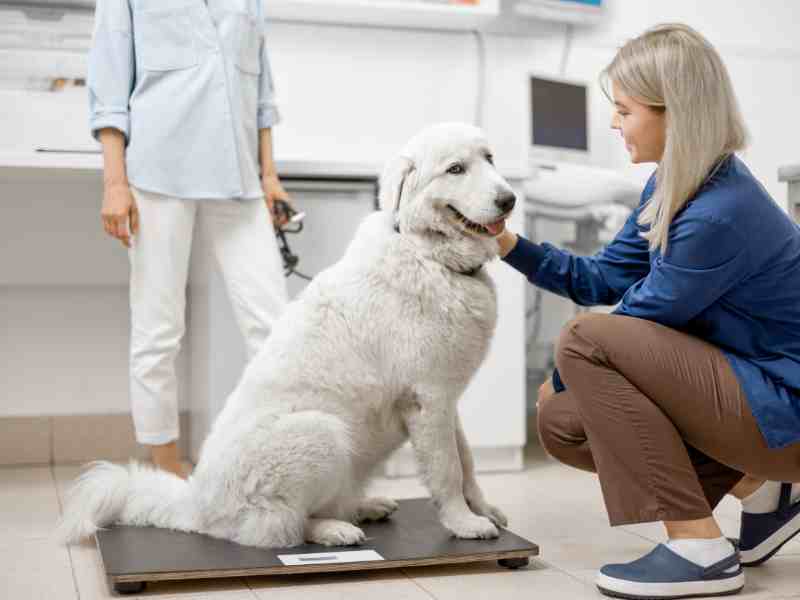Keeping our dogs at a healthy weight is more than just about looking good—it’s crucial for their joint health and overall well-being. When dogs carry extra pounds, it puts unnecessary stress on their joints, which can lead to pain and mobility issues down the line. But managing weight isn’t just about less food or more exercise; it starts with a healthy gut. A well-balanced gut aids in proper nutrient absorption and helps maintain an ideal weight, giving your dog’s joints the break they deserve.
The Connection Between Excess Weight And Joint Health In Dogs
Extra weight in dogs leads to increased mechanical stress on their joints. This stress accelerates the wear and tear on the cartilage, the cushioning material within joints that prevents bone-on-bone friction. This is a key factor in the development of osteoarthritis in dogs.
As the pressure on the joints increases, the rate at which cartilage degrades accelerates. Without sufficient cartilage, the bones begin to rub against each other, leading to pain and reduced mobility. When your dog has joint issues aggravated by extra pounds, they can suffer from inflammation, pain, and decreased mobility.
Over time, the chronic stress and inflammation in the joints can lead to the development of arthritis, characterized by joint pain, stiffness, and swelling. Obesity not only increases the likelihood of developing arthritis but can also exacerbate the symptoms of existing joint conditions.
Dogs with compromised joint health because they are overweight may experience a vicious cycle of reduced activity due to their pain, and then they gain more weight because they can’t exercise. This cycle worsens their joint health.
How Can I Tell If My Dog’s Weight is Healthy?
Visual assessments and body condition scoring are key to determining if a dog is overweight or obese. Your vet does this in their office, but you can do so too. First, look for visible waistlines and feel for ribs under a minimal fat layer. A body condition score chart, often ranging from 1 (emaciated) to 9 (obese), helps give a consistent, standardized assessment. Regular veterinary check-ups are crucial, as they can offer accurate and professional weight and health assessments. They can also give you dietary and lifestyle ideas to help adjust your dog’s weight safely.
The Role of Diet in Dog Weight Management
Just like for humans, diet obviously plays a pivotal role in managing a dog’s weight. A balanced diet that’s high in protein and fiber but low in fat can help control weight and support overall health. When selecting dog food, look for those that promote weight management without compromising nutritional value.
Portion control is equally important; feeding the right amount prevents overfeeding, a common cause of weight gain. Regularly consulting with a vet can also guide adjustments to a dog’s diet to better suit their individual health needs and lifestyle.
The big thing about diet and weight management is that no matter what you’re feeding your dog, you want to make sure they’re getting all the nutrients they should. Optimal nutrient absorption will help make sure you manage your dog’s weight safely, keeping their body fueled and healthy.
Exercise and Activity: Key Components of a Healthy Lifestyle for Dogs
Exercise tailored to their age, breed, and current fitness level is important for maintaining a healthy weight in dogs. Younger, more energetic breeds may benefit from activities like running or agility training, while older dogs might thrive with gentle walks or swimming. Safely increasing activity for overweight dogs starts with low-impact exercises, gradually increasing intensity to avoid injury. Keeping dogs engaged can involve interactive toys, training sessions, or even dog sports, providing mental stimulation and physical exercise. Regular, varied activities help manage weight and improve overall well-being and mental health, but when it comes to joint disease and dog joint health, keeping cartilage moving and healthy also helps tremendously.
Bernie’s Healthy Hips: There’s More Than Weight Loss For Joints
We know firsthand how worrying it can be because we felt the same when Bernie started showing signs of carrying extra weight—every step he took, we wondered how it was impacting his joints. He’s a large breed dog prone to joint issues anyway, so we wanted to do all we could to help him have the best joint health he could. But, we wanted to support him without him feeling hungry or deprived as we managed his weight. That’s where Perfect Poop came in. We packed it with high-quality fibers like Miscanthus grass, dried pumpkin, and flaxseed, to help his gut health be the best and keep him feeling fuller longer.
And while maintaining a healthy weight was key, we didn’t want to overlook consistent joint health care. That’s why we created Healthy Hips. We formulated it with ingredients that have a scientific backing we trusted, not just popular ingredients that science just didn’t support as much. When you’re worried about weight management and joint health in dogs, Perfect Poop and Healthy Hips work together to ensure your dog’s digestive system is top-notch, their weight is managed, and their joints are cared for.
That’s what we call a winning combination!


